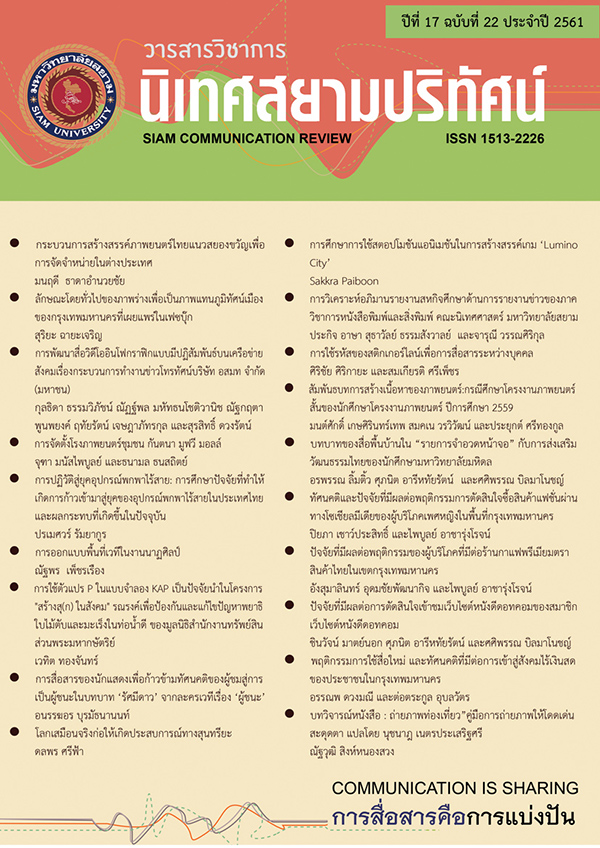Mobile Revolution: A Study of Factors Causing a Step to Mobile Age in Thailand, and Following Impacts
Main Article Content
Abstract
The age of Mobile Revolution has already begun in Thailand. The main factors making the country to this revolution are: 1) Smart Phone handsets featuring touch screen and computer-alike operation system. 2) Fast and stable mobile internet capacity. 3) Smart phone prices and mobile internet fees are decreasing. 4) Social network popularity is on the rise, creating a demand to a person who never had a mobile handset.
The impacts after the Mobile Revolution are: 1) Message sender and receiver addict to mobile device using. 2) Mobile users rapidly and recklessly communicate. 3) Mass media companies turning to use more mobile media 4) “Clickbait” increasingly happened, luring a reader to click to read rather than wrap-up the whole context like same old headline writing.
Article Details
References
อุไรพร ชลสิริรุ่งสกุล. (2557). Digital of Things สรรพสิ่งสื่อสารผ่านดิจิทัล. กรุงเทพฯ: กรุงเทพธุรกิจ มีเดีย.
Eslinger, T. (2014). Mobile Magic. New Jersey: John Wiley & Sons.
Keohane, J. (2017). Business Unusual. Entrepreneur, 27-29.
Bezerra, J., Bock, W., Candelon, F., Chai, S., Choi, E., Corwin, J., DiGrande, S., Gulshan, R., Michael, C. D., & Varas, A. (2015). The Mobile Revolution: How Mobile Technologies Drive a Trillion-Dollar Impact. Retrieved from https://www.bcgperspectives.com/content/articles/telecommunications_technology_business_transformation_mobile_revolution
Kelly, B. (2017). What Is the Role of the Cell Phone in Communication Today?. Retrieved from http://smallbusiness.chron.com/role-cell-phone-communication-today-31479.html
DAAT เผยข้อมูลผู้ใช้อินเทอร์เน็ตของไทย ไตรมาส 1 ประจำปี 2559. (2559). เข้าถึงได้จาก http://www.daat.in.th/index.php/daat-internet/
Elad Nathanson. (2017, 21 February). The Mobile Revolution Is Just Beginning. Forbes. Retrieved from https://www.forbes.com/sites/eladnatanson/2017/02/21/the-mobile-revolution-is-just-beginning/#2e85b1b14c2f
it24hrs. (2560). เผยสถิติโซเชียลไทยใน Thailand Zocial Awards 2017 ผู้ใช้ twitter เติบโตก้าวกระโดด. เข้าถึงได้จาก https://www.it24hrs.com/2017/thailand-zocial-awards-stat-social-media-2017
kadocom. (2555). โรคเสพติดสังคมออนไลน์ระบาดหนัก ไทยติดหง่อม 11 ล้านคน. เข้าถึงได้จาก https://www.sdtc.go.th/paper/595
Leading countries based on number of Facebook users as of April 2017 (in millions). (n.d.). Retrieved from https://www.statista.com/statistics/268136/top-15-countries-based-on-number-of-facebook-users/
Marketing Oops! Admin. (2552). ทิศทางของผู้ใช้อินเทอร์เน็ตในประเทศไทย. เข้าถึงได้จาก https://www.marketingoops.com/reports/internet-trend/
Mobile Market Shares Thailand 2016. (n.d.). Retrieved from http://www.yozzo.com/news-and-information/mvno-mobile-operator-s/mobile-market-shares-thailand-2016
Monica Anderson. (2015). Technology Device Ownership: 2015. Retrieved from http://www.pewinternet.org/2015/10/29/technology-device-ownership-2015/
Roland Banks. (2015). The mobile revolution is changing how we work. Retrieved from http://www.mobileindustryreview.com/2015/03/mobile-revolution-changing-work.html
Simon Kemp. (2017). Digital in 2017: Global Overview. Retrieved from https://wearesocial.com/special-reports/digital-in-2017-global-overview


